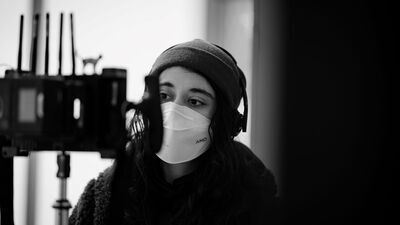What was your experience going through the various Australian development pipelines?
I was lucky to be supported through most of the development. I wrote the first draft on spec, but from there on I did receive support. I was really lucky to be working with an amazing script editor Lynne Vincent McCarthy, who’s also Jennifer Kent’s script editor. She helped me in many ways to find that objectivity and was a sounding board as well. But in terms of the actual notes that came through during the pipeline of the screen agencies, they didn’t have a lot of heavy handed notes. I found the process actually quite smooth. I think part of the reason is because of the film’s cultural specificity and uniqueness in the Australian film landscape, because it’s from a person who’s lived that specific experience. I think there was a level of trust in my writing and ability to bring this story to screen. I’ve heard a lot of stories from Australian filmmakers that the agencies might give too many notes or notes that are not aligned with their vision, but I didn’t find that to be the case for “Shayda.” I felt if anything they definitely challenged me in the right ways. But I always felt that I had that trust and support.
The film is set in 1995, and you use that amazing Rozalla song “Everybody’s Free,” which fits beautifully with the film’s themes, but is also such a bop. How did you come to use that song?
This song is so monumental in so many ways. I grew up with 90s music, and especially because my mom would actually be going to nightclubs as a single mom in the 90s. So she would play all of these songs as we were growing up. “Everybody’s Free” was one of those songs to be honest and it always stayed with me. I just felt that it fit that euphoric moment in Shayda’s journey so beautifully. Especially because the film is so much about finding freedom and finding agency in one’s life. It’s all about her choosing. Choosing how to live her life, how to dress, how to divorce how to, how to have an education, and how to give her daughter a different life. I think that song just beautifully exemplifies that sense of a woman having agency. And, yea, it’s such a wonderful song to dance to as well. It’s a real anthem.
Obviously Zar Amir Ebrahimi has had an amazing couple of years. But this was the first performance for Selina Zahednia playing Mona.
I was so lucky to work with Zar, especially off the back of her winning best actress at Cannes. We actually cast her before “Holy Spider” came out. So it was just an incredible year for her and she brought so much to the role, so much nuance and emotionality and strength. I think she carries the film beautifully.
But also equally, I think Selina is a remarkable talent. She was six years old when she starred in the film. I was so fortunate. She was one of a hundred girls who auditioned for the film via self tapes. Then she was one of ten who did callbacks in Melbourne. As soon as she walked into the room, I just felt her star quality, her energy. She sat down and I gave her a situation and she cried, but not because I prompted her to, it was just how she felt in the moment. It was just one of those auditions that blows you away. I cast her immediately because she just had this emotional intelligence beyond her years. I spent around two months in rehearsals with her and my assistant to really get her prepared for the shoot and for meeting Zar and everything that was required. Especially because I wanted to protect her from the material of the film. To this day, she doesn’t really know what the film is really about. We went to great great lengths to protect her.

